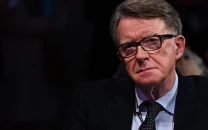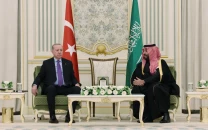Trump set for China trip amid renewed détente
Experts hail growing interactions between two world powers as a positive development for global stability

US President Donald Trump has announced that he has accepted an invitation from Chinese President Xi Jinping to visit Beijing in April, adding that he has invited Xi to the United States for a state visit later next year, according to the Associated Press.
The development followed a phone call between the two leaders nearly a month after their in-person meeting in Busan, South Korea, during which they discussed Taiwan, Ukraine, and ongoing trade negotiations.
Trump revealed the exchange in a Truth Social post, writing: “Our relationship with China is extremely strong! Now we can set our sights on the big picture. To that end, President Xi invited me to visit Beijing in April, which I accepted, and I reciprocated where he will be my guest for a state visit in the US later in the year.” He added that the call touched on the Russia-Ukraine war, fentanyl and US agricultural exports, including soybeans.
CNBC quoted White House Press Secretary Karoline Leavitt as saying that the call — which lasted about an hour — was “a very positive call” and focused on a trade deal that Washington is working to finalise with Beijing. “Those relations and how they are moving in a positive direction,” she said, were the core of the discussion.
Beijing did not mention the planned state visits. Instead, the Chinese Foreign Ministry stressed that Xi had reiterated Beijing’s stance on Taiwan, calling the island’s return to mainland China “an integral part of the postwar international order.” Xi also linked the Taiwan question to broader historical context, telling Trump that China and the US had “fought shoulder to shoulder against fascism and militarism,” and that both sides must safeguard the victory of World War II, China’s Xinhua reported.
The Chinese statement further added that Trump told Xi that “China was a big part of the victory of WWII, stressing that the United States understands how important the Taiwan question is to China.” Trump’s public remarks, however, did not mention Taiwan — an omission analysts say underscores persistent tensions between the two global powers.
Despite Washington’s longstanding policy of strategic ambiguity on Taiwan, the topic has grown more sensitive amid a sharp downturn in China-Japan relations. The call came shortly after Japanese Prime Minister Sanae Takaichi made a provocative statement that Japan’s military could intervene if China acted against Taiwan.
Beijing condemned the remarks, with Chinese Foreign Minister Wang Yi warning that Tokyo had “crossed a red line that should not have been touched.”
Trump and Xi also discussed the war in Ukraine, the Chinese Foreign Ministry said. Xi reiterated China’s position, stating that Beijing supports “all efforts that are conducive to peace,” and expressed hope that parties to the conflict would narrow differences and reach a “fair, lasting and binding peace agreement at an early date.” Trump said he raised issues including “fentanyl, soybeans and other farm products,” though China’s account did not reference these topics.
Trump noted that since his late-October meeting with Xi in Busan, the two sides had made “significant progress” on updating bilateral agreements. In recent weeks, China has ordered nearly 2 million metric tons of US soybeans, the first such purchases after a months-long boycott. Beijing also relaxed export controls of some of the rare earth minerals. In return, Washington eased some tariffs on Chinese goods and scaled back export controls, including restrictions on advanced computer chips central to the artificial-intelligence race.
For Beijing, the call underscored the importance of sustaining diplomatic momentum. Xi said the two global powers “should keep up the momentum in ties, and keep moving forward in the right direction on the basis of equality, respect and mutual benefit.” He added that his Busan meeting with Trump had “recalibrated the course of the giant ship of China-US relations and provided more momentum for it to sail forward steadily.”
Xi said the relationship has “generally maintained a steady and positive trajectory,” which he argued benefits not only the two nations but the international community. He added that history repeatedly demonstrates that cooperation benefits both sides whereas confrontation harms both. The vision of China and the US prospering together, he said, remains “a tangible prospect within reach.”
Calling for greater bilateral engagement, Xi urged both nations to “lengthen the list of cooperation and shorten the list of problems,” with the aim of creating more space for joint initiatives and delivering benefits to both peoples.
Trump echoed the positive tone, calling Xi a “great leader.” He said he “very much enjoyed” their Busan meeting and “fully shares” Xi’s comments about bilateral ties, noting that both sides are implementing all elements of their Busan commitments. With trade tensions easing, Trump wrote that “Now we can set our sights on the big picture.”
The US-China detente is being welcomed by experts and world leaders as a positive development for global stability. While the latest exchanges amount to a “temporary stabilisation” or diplomatic “ceasefire” rather than a fundamental reset, they are regarded as vital for safeguarding the world economy and creating space to address key international challenges.
Last month, the International Monetary Fund warned that tensions between the US and China would “exacerbate uncertainty and hurt an already weakened global growth picture … and global growth could fall by 0.3%.”



















COMMENTS
Comments are moderated and generally will be posted if they are on-topic and not abusive.
For more information, please see our Comments FAQ